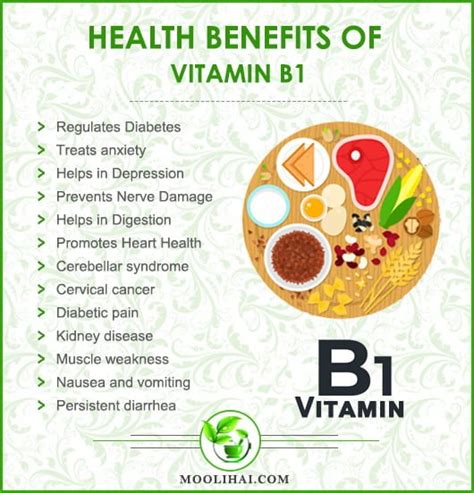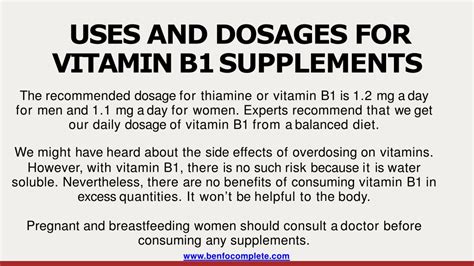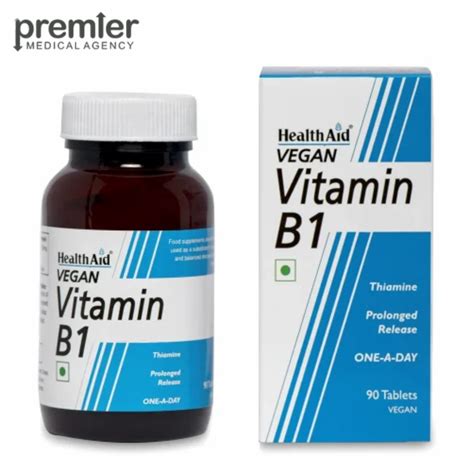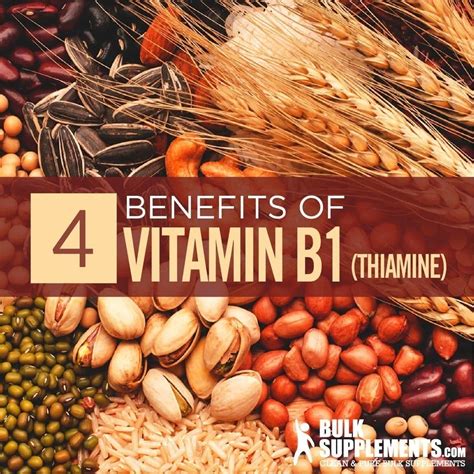Intro
Vitamin B1, also known as thiamine, is an essential nutrient that plays a critical role in energy production, nerve function, and heart health. As an adult, it is crucial to consume the recommended daily dosage of vitamin B1 to maintain optimal health. The importance of vitamin B1 cannot be overstated, and its deficiency can lead to a range of health problems, including beriberi, a condition characterized by weakness, fatigue, and nerve damage.
The human body relies heavily on vitamin B1 to convert carbohydrates into energy, and it is also necessary for the proper functioning of the nervous system. Moreover, vitamin B1 has antioxidant properties, which help protect cells from damage caused by free radicals. With the increasing demands of modern life, it is easy to overlook the importance of nutrition, but consuming the right amount of vitamin B1 can have a significant impact on overall health and well-being. Whether you are an athlete, a busy professional, or simply looking to maintain good health, understanding the recommended vitamin B1 dosage for adults is essential.
In today's fast-paced world, it is easy to neglect our diet and rely on processed foods, which are often deficient in essential nutrients like vitamin B1. However, with a little knowledge and planning, it is possible to ensure that you are getting the recommended daily dosage of vitamin B1. The good news is that vitamin B1 is found in a wide range of foods, including whole grains, nuts, seeds, and lean proteins. By making informed food choices and considering supplements if necessary, adults can maintain optimal levels of vitamin B1 and enjoy the many health benefits it provides.
Vitamin B1 Benefits For Adults

The benefits of vitamin B1 for adults are not limited to physical health; it also has a significant impact on mental well-being. Vitamin B1 is involved in the production of neurotransmitters like serotonin and dopamine, which regulate mood and emotions. A deficiency in vitamin B1 can lead to depression, anxiety, and other mental health problems. Furthermore, vitamin B1 is essential for maintaining healthy skin, hair, and nails, and its deficiency can cause skin problems, hair loss, and brittle nails.
Vitamin B1 Food Sources
Vitamin B1 is found in a wide range of foods, including whole grains, nuts, seeds, and lean proteins. Some of the richest sources of vitamin B1 include brown rice, quinoa, sunflower seeds, flaxseeds, and lean meats like chicken and fish. Fortified cereals and energy bars are also good sources of vitamin B1. However, it is essential to note that vitamin B1 is water-soluble, which means that it can be lost during cooking and processing. To maximize the vitamin B1 content of your diet, it is best to consume whole, unprocessed foods and cook them lightly.Vitamin B1 Dosage Recommendations

It is essential to note that these are general recommendations, and individual needs may vary. Some people may require higher doses of vitamin B1 due to certain medical conditions or medications. For example, people with diabetes, HIV/AIDS, or liver disease may require higher doses of vitamin B1 to manage their condition.
Vitamin B1 Deficiency Symptoms
A deficiency in vitamin B1 can cause a range of symptoms, including: * Fatigue and weakness * Nerve damage and numbness * Depression and anxiety * Skin problems and hair loss * Digestive problems and diarrhea * Shortness of breath and rapid heartbeatIf left untreated, a vitamin B1 deficiency can lead to more severe health problems, including beriberi, a condition characterized by weakness, fatigue, and nerve damage. In severe cases, a vitamin B1 deficiency can cause heart failure, paralysis, and even death.
Vitamin B1 Supplements

When choosing a vitamin B1 supplement, look for products that are made from high-quality ingredients and are free from additives and fillers. It is also essential to follow the recommended dosage and start with a low dose to minimize the risk of side effects.
Vitamin B1 Interactions
Vitamin B1 can interact with certain medications and supplements, including: * Diuretics: These medications can increase the excretion of vitamin B1 in the urine. * Antidepressants: Certain antidepressants can interact with vitamin B1 and increase the risk of side effects. * Blood thinners: Vitamin B1 can increase the risk of bleeding when taken with blood thinners.It is essential to consult with a healthcare professional before taking vitamin B1 supplements, especially if you are taking any medications or have a medical condition.
Vitamin B1 Side Effects

It is essential to follow the recommended dosage and consult with a healthcare professional if you experience any side effects.
Vitamin B1 Overdose
A vitamin B1 overdose can cause severe health problems, including: * Respiratory failure * Cardiac arrest * Seizures and comaIf you suspect a vitamin B1 overdose, seek medical attention immediately.
What are the benefits of vitamin B1 for adults?
+Vitamin B1 offers numerous health benefits for adults, including energy production, nerve function, and heart health. It plays a critical role in converting carbohydrates into energy, which is essential for maintaining physical and mental performance.
What are the symptoms of a vitamin B1 deficiency?
+A deficiency in vitamin B1 can cause a range of symptoms, including fatigue and weakness, nerve damage and numbness, depression and anxiety, skin problems and hair loss, digestive problems and diarrhea, and shortness of breath and rapid heartbeat.
Can I get enough vitamin B1 from food sources?
+Yes, it is possible to get enough vitamin B1 from food sources. Vitamin B1 is found in a wide range of foods, including whole grains, nuts, seeds, and lean proteins. However, some people may require supplements to meet their daily needs.
What are the potential interactions between vitamin B1 and medications?
+Vitamin B1 can interact with certain medications, including diuretics, antidepressants, and blood thinners. It is essential to consult with a healthcare professional before taking vitamin B1 supplements, especially if you are taking any medications or have a medical condition.
What are the side effects of high doses of vitamin B1?
+High doses of vitamin B1 can cause side effects, including nausea and vomiting, diarrhea and abdominal pain, headache and dizziness, and allergic reactions and skin rashes. It is essential to follow the recommended dosage and consult with a healthcare professional if you experience any side effects.
In conclusion, vitamin B1 is an essential nutrient that plays a critical role in energy production, nerve function, and heart health. Understanding the recommended daily dosage of vitamin B1 and maintaining optimal levels through diet and supplements can have a significant impact on overall health and well-being. By making informed choices and consulting with a healthcare professional, adults can ensure they are getting enough vitamin B1 to maintain optimal health. We encourage you to share this article with others and start a conversation about the importance of vitamin B1 in maintaining good health. If you have any questions or comments, please feel free to leave them below.
